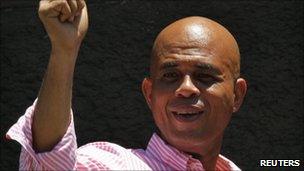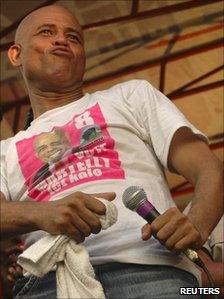Profile: Michel Martelly
- Published

Mr Martelly has promised change to the Haitian people
Michel Martelly, also known as Sweet Micky, was inaugurated as Haiti's president on 14 May, promising to rebuild the earthquake-ravaged nation.
He won 68% of votes in the 20 March presidential run-off which pitted him against former First Lady Mirlande Manigat.
The 50-year-old flamboyant musician is a political novice but is confident performing in front of crowds.
Promising change in a country still shaken by the 2010 quake, he has gained a loyal following, being especially popular among younger voters.
Despite being politically inexperienced, his message of reform has appealed to Haiti's poor and unemployed, correspondents say.
While he has held no formal position in the field, he has been politically active, holding speeches and taking part in demonstrations.
He has been a vocal critic of former Haitian President Jean-Bertrand Aristide, who recently returned from exile.
During his campaign, he pledged to build houses in a country where tens of thousands still live in makeshift camps more than a year after the quake, which killed at least 250,000 people.
He also promised to restore the armed forces - which were disbanded by Mr Aristide in 1995 after years of abuse.
Costumes and wigs
The son of an oil company executive, Mr Martelly became popular in Haiti as a singer of Haitian dance music known as compas.
As an entertainer, he often wore costumes and wigs, and has been known to drop his trousers on stage.
He has also worked as a construction worker in Miami.

The singer is known for his flamboyant style and stage antics
The singer now lives with his wife, Sophia, and his four children, in Petionville, in the hills above the Haitian capital of Port-au-Prince.
He was educated at a prestigious Roman Catholic school in Port-au-Prince and attended junior colleges in the US, though he never graduated.
In the election run-off, he had the support of five candidates eliminated in the first round, as well as the backing of fellow musician Wyclef Jean, whose own candidacy was ruled invalid.
He has described himself as a "clean man", distancing himself from links to a paramilitary group set up to undermine the administration of Mr Aristide.
Politics appears to run in his family; his grandfather, Auguste "Kandjo" de Pradines, was a French singer who used his talent to protest against the US military occupation from 1915-34.
Despite trading his colourful stage costumes for suits on the campaign trail, he has referred to his musical success as he sought support for the presidency.
"He symbolises a renewal of the Haitian music industry as he created a bridge between the old and new generation," reads his website.
"Once more, Michel Martelly will be the bridge between our destructive past and the aspirations of the new generation who would care for Haiti to become one of the most prosperous countries in the Caribbean at the service of all its inhabitants."
The star is said to have received his stage name - Sweet Micky - in the 1980s while performing at clubs. One night a friend introduced him as "a sweet Micky for a sweet people".
- Published5 April 2011
- Published21 March 2011
- Published8 February 2012
- Published16 March 2011